#Back-end development
Explore tagged Tumblr posts
Text

The Comprehensive Guide to Web Development, Data Management, and More
Introduction
Everything today is technology driven in this digital world. There's a lot happening behind the scenes when you use your favorite apps, go to websites, and do other things with all of those zeroes and ones — or binary data. In this blog, I will be explaining what all these terminologies really means and other basics of web development, data management etc. We will be discussing them in the simplest way so that this becomes easy to understand for beginners or people who are even remotely interested about technology. JOIN US
What is Web Development?
Web development refers to the work and process of developing a website or web application that can run in a web browser. From laying out individual web page designs before we ever start coding, to how the layout will be implemented through HTML/CSS. There are two major fields of web development — front-end and back-end.
Front-End Development
Front-end development, also known as client-side development, is the part of web development that deals with what users see and interact with on their screens. It involves using languages like HTML, CSS, and JavaScript to create the visual elements of a website, such as buttons, forms, and images. JOIN US
HTML (HyperText Markup Language):
HTML is the foundation of all website, it helps one to organize their content on web platform. It provides the default style to basic elements such as headings, paragraphs and links.
CSS (Cascading Style Sheets):
styles and formats HTML elements. It makes an attractive and user-friendly look of webpage as it controls the colors, fonts, layout.
JavaScript :
A language for adding interactivity to a website Users interact with items, like clicking a button to send in a form or viewing images within the slideshow. JOIN US
Back-End Development
The difference while front-end development is all about what the user sees, back end involves everything that happens behind. The back-end consists of a server, database and application logic that runs on the web.
Server:
A server is a computer that holds website files and provides them to the user browser when they request it. Server-Side: These are populated by back-end developers who build and maintain servers using languages like Python, PHP or Ruby.
Database:
The place where a website keeps its data, from user details to content and settings The database is maintained with services like MySQL, PostgreSQL, or MongoDB. JOIN US
Application Logic —
the code that links front-end and back-end It takes user input, gets data from the database and returns right informations to front-end area.

Why Proper Data Management is Absolutely Critical
Data management — Besides web development this is the most important a part of our Digital World. What Is Data Management? It includes practices, policies and procedures that are used to collect store secure data in controlled way.
Data Storage –
data after being collected needs to be stored securely such data can be stored in relational databases or cloud storage solutions. The most important aspect here is that the data should never be accessed by an unauthorized source or breached. JOIN US
Data processing:
Right from storing the data, with Big Data you further move on to process it in order to make sense out of hordes of raw information. This includes cleansing the data (removing errors or redundancies), finding patterns among it, and producing ideas that could be useful for decision-making.
Data Security:
Another important part of data management is the security of it. It refers to defending data against unauthorized access, breaches or other potential vulnerabilities. You can do this with some basic security methods, mostly encryption and access controls as well as regular auditing of your systems.
Other Critical Tech Landmarks
There are a lot of disciplines in the tech world that go beyond web development and data management. Here are a few of them:
Cloud Computing
Leading by example, AWS had established cloud computing as the on-demand delivery of IT resources and applications via web services/Internet over a decade considering all layers to make it easy from servers up to top most layer. This will enable organizations to consume technology resources in the form of pay-as-you-go model without having to purchase, own and feed that infrastructure. JOIN US
Cloud Computing Advantages:
Main advantages are cost savings, scalability, flexibility and disaster recovery. Resources can be scaled based on usage, which means companies only pay for what they are using and have the data backed up in case of an emergency.
Examples of Cloud Services:
Few popular cloud services are Amazon Web Services (AWS), Microsoft Azure, and Google Cloud. These provide a plethora of services that helps to Develop and Manage App, Store Data etc.
Cybersecurity
As the world continues to rely more heavily on digital technologies, cybersecurity has never been a bigger issue. Protecting computer systems, networks and data from cyber attacks is called Cyber security.
Phishing attacks, Malware, Ransomware and Data breaches:
This is common cybersecurity threats. These threats can bear substantial ramifications, from financial damages to reputation harm for any corporation.
Cybersecurity Best Practices:
In order to safeguard against cybersecurity threats, it is necessary to follow best-practices including using strong passwords and two-factor authorization, updating software as required, training employees on security risks.
Artificial Intelligence and Machine Learning
Artificial Intelligence (AI) and Machine Learning (ML) represent the fastest-growing fields of creating systems that learn from data, identifying patterns in them. These are applied to several use-cases like self driving cars, personalization in Netflix.
AI vs ML —
AI is the broader concept of machines being able to carry out tasks in a way we would consider “smart”. Machine learning is a type of Artificial Intelligence (AI) that provides computers with the ability to learn without being explicitly programmed. JOIN US
Applications of Artificial Intelligence and Machine Learning: some common applications include Image recognition, Speech to text, Natural language processing, Predictive analytics Robotics.
Web Development meets Data Management etc.
We need so many things like web development, data management and cloud computing plus cybersecurity etc.. but some of them are most important aspects i.e. AI/ML yet more fascinating is where these fields converge or play off each other.
Web Development and Data Management
Web Development and Data Management goes hand in hand. The large number of websites and web-based applications in the world generate enormous amounts of data — from user interactions, to transaction records. Being able to manage this data is key in providing a fantastic user experience and enabling you to make decisions based on the right kind of information.
E.g. E-commerce Website, products data need to be saved on server also customers data should save in a database loosely coupled with orders and payments. This data is necessary for customization of the shopping experience as well as inventory management and fraud prevention.
Cloud Computing and Web Development
The development of the web has been revolutionized by cloud computing which gives developers a way to allocate, deploy and scale applications more or less without service friction. Developers now can host applications and data in cloud services instead of investing for physical servers.
E.g. A start-up company can use cloud services to roll out the web application globally in order for all users worldwide could browse it without waiting due unavailability of geolocation prohibited access.
The Future of Cybersecurity and Data Management
Which makes Cybersecurity a very important part of the Data management. The more data collected and stored by an organization, the greater a target it becomes for cyber threats. It is important to secure this data using robust cybersecurity measures, so that sensitive information remains intact and customer trust does not weaken. JOIN US
Ex: A healthcare provider would have to protect patient data in order to be compliant with regulations such as HIPAA (Health Insurance Portability and Accountability Act) that is also responsible for ensuring a degree of confidentiality between a provider and their patients.
Conclusion
Well, in a nutshell web-developer or Data manager etc are some of the integral parts for digital world.
As a Business Owner, Tech Enthusiast or even if you are just planning to make your Career in tech — it is important that you understand these. With the progress of technology never slowing down, these intersections are perhaps only going to come together more strongly and develop into cornerstones that define how we live in a digital world tomorrow.
With the fundamental knowledge of web development, data management, automation and ML you will manage to catch up with digital movements. Whether you have a site to build, ideas data to manage or simply interested in what’s hot these days, skills and knowledge around the above will stand good for changing tech world. JOIN US
#Technology#Web Development#Front-End Development#Back-End Development#HTML#CSS#JavaScript#Data Management#Data Security#Cloud Computing#AWS (Amazon Web Services)#Cybersecurity#Artificial Intelligence (AI)#Machine Learning (ML)#Digital World#Tech Trends#IT Basics#Beginners Guide#Web Development Basics#Tech Enthusiast#Tech Career#america
4 notes
·
View notes
Text
Certificate Course in PHP Full Stack Developer at Nextskill Technologies, Coimbatore

In today's rapidly evolving digital landscape, the demand for skilled web developers is at an all-time high. Among the various programming languages, PHP Full Stack has emerged as a powerful and widely-used scripting language for web development. If you are keen on exploring a career in this exciting field, look no further than the Certificate Course in PHP Full Stack Developer offered by Nextskill Technologies in Coimbatore. This comprehensive program is designed to equip you with the knowledge and practical skills necessary to excel in the world of web development. Let's dive into the details of this exceptional course.
Why Certificate Course in PHP Full Stack Developer?
Before delving into the specifics of the course, let's understand why PHP Full Stack Developer is a lucrative and sought-after skill in the tech industry.
Versatility: PHP Full Stack can be seamlessly integrated with various databases, frameworks, and content management systems, making it a versatile language for developing dynamic web applications.
High Demand: Many popular websites, including Facebook and WordPress, are built using PHP Frameworks. The language's prevalence ensures a steady demand for skilled PHP Full Stack developers.
Open Source Advantage: Being an open-source language, PHP Frameworks is constantly updated and enriched by a vibrant community of PHP developers, providing access to a vast array of libraries and tools.
Career Growth: PHP developers can explore various career paths, such as PHP full-stack developers,PHP backend developers, or even specialize in PHP-based frameworks like Laravel or CodeIgniter.
Nextskill Technologies: Empowering Your Journey
Located in the heart of Coimbatore, Nextskill Technologies has earned a reputation as a leading IT training institute with a focus on cutting-edge technologies. Their Certificate Course in PHP Full Stack Developer is a well-structured program that caters to both beginners and experienced professionals looking to enhance their web development skills.
Course Curriculum Certificate Course in PHP Full Stack Developer at Nextskill Technologies is designed to provide a comprehensive understanding of web development principles and practical hands-on experience. The well-organized curriculum includes:
Introduction to Web Development: An overview of web development, its technologies, and the role of PHP Full Stack Developer.
HTML, CSS, and JavaScript Fundamentals: Building a strong foundation in front-end development.
PHP Programming Basics: Learning PHP syntax, variables, operators, and control structures.
MySQL Database Integration: Understanding database design and integration with PHP frameworks.
Object-Oriented PHP: Mastering object-oriented PHP programming concepts and their implementation in PHP.
PHP Frameworks: Exploring popular PHP frameworks like Laravel for efficient development.
Front-end Frameworks: Implementing front-end frameworks like Bootstrap for responsive design.
Project Work: Applying the learned concepts to real-world projects under the guidance of experienced mentors.
Key Features of the Course
Experienced Faculty: The course is taught by industry experts with extensive experience in PHP Full Stack Developer, ensuring a quality learning experience.
Hands-on Training: Practical exercises and real-world projects provide students with valuable hands-on experience.
Placement Assistance: The institute offers placement support and guidance to help students kickstart their careers.
Certification: Upon successful completion of the course, participants receive a recognized certificate, adding value to their resumes.
Conclusion
The Certificate Course in PHP Full Stack Developer at Nextskill Technologies, Coimbatore, is an excellent opportunity for aspiring web developers to gain the skills and knowledge required to thrive in the competitive tech industry. With a well-structured curriculum, experienced faculty, and a supportive learning environment, this course serves as a stepping stone towards a successful career in PHP Full Stack Developer. Embrace this opportunity, and let Nextskill Technologies be your guide on this rewarding journey.
For More Details: https://nextskilltechnologies.com/
#PHP Full Stack Developer#PHP Developer#web development#PHP Programming#Front-end Development#Back-end Development#PHP Frameworks#html#css
2 notes
·
View notes
Text
The Web Developer Bootcamp 2025 - Free Course
Course Content
Introduction to Web Development
Building Web Pages with HTML5 & CSS3
JavaScript Basics & Advanced Concepts
Back-End Development with Node.js
Database Management with MongoDB
Building Full-Stack Web Applications
Deploying Projects to the Web
Join Now
#Web Development#Full-Stack Development#Udemy Course#Web Developer Bootcamp#Free Web Development Course#Learn HTML & CSS#JavaScript Basics#Node.js#MongoDB#Web Development Training#Free Online Course#Build Web Applications#Back-End Development#Front-End Development#Enroll Now#Programming Course#Beginner Web Development#Web Development Certification#Learn to Code#Web Development Bootcamp 2025#Free Coding Course
0 notes
Text
Unlock Seamless Web Performance with Skilled Back-End Developers 🚀
In today’s digital world, seamless web performance is crucial to keeping users engaged and satisfied. Whether you're building an e-commerce platform, a business website, or a complex web application, the backbone of your project lies in solid back-end development. 🧱 The back-end is responsible for how your website functions, interacts with databases and handles user requests efficiently. To achieve top-notch performance, it’s essential to Hire Back End Developers who specialize in crafting scalable, secure, and optimized web solutions.

What Is Back-End Development? 🤔
Before diving into the benefits of hiring skilled back-end developers, let’s quickly break down what back-end development entails. Unlike front-end development, which focuses on the user interface and design aspects, back-end development deals with the server side of your web application. This includes database management, server logic, APIs, and everything that keeps your website running smoothly behind the scenes. 💻
The role of a back-end developer is to ensure that data flows seamlessly between the server, database, and browser, making the user experience as smooth as possible. A poorly built back-end can lead to slow loading times, frequent crashes, and security vulnerabilities, all of which can drive users away. 📉
Why Should You Hire Back-End Developers? 🛠️
When you hire back-end developers, you're investing in the backbone of your web applications. Here’s why that decision is critical for your business:
1. Improved Website Performance ⚡
One of the primary responsibilities of back-end developers is to ensure your website runs quickly and efficiently. They optimize the server, write clean code, and use best practices to reduce load times and enhance overall performance. Whether you’re handling thousands of users or a few, seamless performance keeps them coming back. 🏃♂️
2. Enhanced Security 🔒
Security is a top priority for any business with an online presence. Skilled back-end developers implement robust security measures like data encryption, secure authentication methods, and firewalls to protect sensitive information from cyber threats. This ensures that your website and its users are safe from breaches and vulnerabilities. 🛡️
3. Scalability 📈
Your web apps need to be able to manage more data and traffic as your company expands. Back-end developers build scalable solutions that can grow alongside your business without compromising on performance. Whether you're planning to add new features, integrate third-party services, or expand your user base, scalable architecture is key. 🌐
4. Seamless Data Management 🗄️
From handling large databases to managing real-time data, back-end developers ensure your website processes information smoothly. They design and implement efficient database structures that allow for quick retrieval and storage of data, which is vital for any web application, especially in industries like e-commerce, where data is constantly flowing. 💡
5. Smooth Integration with Front-End 🖥️
Back-end development doesn’t happen in isolation; it works hand-in-hand with the front-end to create a seamless user experience. By collaborating with front-end developers, back-end developers ensure that all features, functionalities, and designs work harmoniously. This results in a cohesive website that looks good and functions flawlessly. ✨
Key Skills to Look For in Back-End Developers 🧑💻

If you're ready to Hire back-end developers, it’s important to know what skills to prioritize. A skilled back-end developer should possess the following expertise:
Programming Languages: Proficiency in server-side languages like Python, Ruby, Java, PHP, or Node.js is essential. Each project might require a specific language based on its complexity and requirements. 🔤
Database Management: Knowledge of database technologies like MySQL, MongoDB, PostgreSQL, or Oracle is critical. A good back-end developer can design, implement, and optimize databases for fast and efficient data handling. 📊
API Integration: Back-end developers often work on integrating third-party services, so understanding RESTful APIs and SOAP is a must. They ensure your web application can communicate with other services, allowing for added functionality. 🔗
Version Control: Proficiency with version control systems like Git ensures that developers can collaborate effectively and track changes to the codebase. 🧩
Security Best Practices: Ensuring secure web development practices, such as input validation, encryption, and secure authentication protocols, is crucial for protecting your website and users. 🔐
The Process of Hiring Back-End Developers 🚀
When you set out to hire back-end developers, follow these steps to ensure you find the right talent for your project:
Define Your Project Requirements: Before beginning your search, outline what your web application needs in terms of functionality, performance, and scalability. This will help you identify the skills and experience necessary for your developers. 📝
Review Portfolios and Experience: Examine potential candidates’ portfolios to assess their previous work. Look for experience in projects similar to yours, especially in the same industry or technology stack. 📁
Conduct Technical Interviews: Test their knowledge of programming languages, databases, and security practices through interviews and coding challenges. This helps you gauge their problem-solving skills and ability to deliver quality solutions. 🎯
Check for Collaboration Skills: Since back-end developers often work closely with front-end developers and other team members, strong communication and teamwork abilities are important. 🗣️
Conclusion: Invest in Quality Back-End Development 🔥

The importance of seamless web performance cannot be overstated, and it all starts with a well-structured back-end. When you Hire Back End Developers who are skilled, experienced, and dedicated, you're ensuring that your website delivers a superior user experience, is secure, and can scale as your business grows. Don’t compromise on your web development—partner with the best back-end developers to unlock the full potential of your web applications! 💼
0 notes
Text
The Basics of Back-End Development and How Node.js Enhances It

Back-end development is the engine behind web applications, managing server-side tasks like database handling and communication between the front end and the servers. More than 55% of developers focus on back-end technologies, showing just how vital it is for building secure, efficient, and scalable apps that deliver a smooth user experience.
Node.js is a popular choice for enhancing back-end development, known for its speed and ability to handle high traffic. Today, over 30 million websites use Node.js, and 85% of developers report that it significantly boosts application performance. Its efficiency makes it perfect for real-time applications like chat platforms, gaming servers, and other data-heavy projects.
What is Back-End Development?
Back-end development refers to server-side operations that support the front-end of web applications. It involves database management, server configuration, APIs, and application logic, all working together to handle requests and provide data to users.
Key Components of Back-End Development
Server: The central hub where all requests are processed and managed.
Database: Where information is stored, retrieved, and manipulated.
APIs: These allow different systems and applications to communicate with each other.
Authentication and Security: Ensuring that data is accessed only by authorized users is a critical back-end task.
Why Choose Node.js for Back-End Development?
When deciding on a framework for back-end development, Node.js is a top contender due to its speed, scalability, and efficiency. Built on JavaScript, Node.js allows developers to use the same language for both front-end and back-end, leading to faster and more streamlined development.
The Strength of Node.js in Back-End
One of the key strengths of Node.js is its non-blocking, event-driven architecture. This design allows it to handle multiple requests at once without slowdowns, making it ideal for real-time applications such as chat platforms and online games.
Another major advantage is the vast library of packages available through npm. These pre-built modules simplify common back-end tasks, helping developers work more efficiently and save time.
With these features, Node.js becomes an excellent choice for creating responsive, high-performing back-end systems.
Advantages of Using Node.js for Your Back-End
Fast and Lightweight: Node.js uses Google’s V8 engine, allowing for high-speed execution of code.
Scalability: Perfect for applications expected to grow over time, Node.js allows developers to scale the back-end effortlessly.
Unified Codebase: With JavaScript running on both the client and server-side, developers can maintain a cleaner and more unified codebase.
Vibrant Community: Node.js boasts a massive community of developers contributing open-source tools, making it easier to find solutions and innovate faster.
When Should You Use Node.js for Back-End?
Node.js is an excellent choice when you need high-speed processing and scalability. It's particularly useful for:
Real-time Applications: Ideal for chat apps, live-streaming platforms, or collaborative tools where instant updates are essential.
Microservices: Perfect for breaking down large applications into smaller, manageable services that work together efficiently.
API-driven Platforms: Node.js excels at creating fast, scalable, and lightweight APIs that can be easily consumed by front-end applications.
Conclusion: Boost Your Back-End with Node.js
The basics of back-end development focus on managing databases, servers, and APIs, while ensuring smooth communication between the client and server. Node.js enhances this process by offering speed, scalability, and an efficient development environment, making it an excellent choice for modern applications.To unlock the full potential of your back-end, it's essential to partner with skilled professionals. For the best results, consider Hire Dedicated Nodejs developers who can tailor solutions to your business needs, ensuring high performance and seamless scalability.
#Basics of Back-End Development#Node.js for Back-End#hire dedicated node.js developers#Back-End Development#Node.js Enhancements#Back-End Development with Node.js#Web Development with Node.js
0 notes
Text
Back-End Development
VCD Studio provides tailored back-end development services, ensuring your website's functionality is robust and secure. Their team of skilled developers specialises in building scalable solutions, handling server-side programming, database management, and API integrations. With a focus on performance, security, and seamless integration with front-end systems, VCD Studio's back-end development services ensure a smooth and reliable user experience.
0 notes
Text

Do you need a website?
just CLICK HERE and build your own website by your choice.
https://go.fiverr.com/visit/?bta=1026601&brand=fiverrmarketplace&landingPage=https%253A%252F%252Fwww.fiverr.com%252Fs%252FKe716Q4
#Website Design#Web Development#Responsive Web Design#UI/UX Design#Web Design Trends#Custom Web Design#Web Development Services#Front-End Development#Back-End Development#Full-Stack Development#WordPress Design#E-commerce Web Design#Website Redesign#Mobile Web Design#Web Design Inspiration#Website Optimization#SEO Web Design#Web Design Best Practices#Website User Experience#Web Design Principles#Graphic Design for Websites#Website Development Tools#Content Management Systems#Website Speed Optimization#HTML/CSS Design#JavaScript Development#Website Accessibility#Interactive Web Design#Website Prototyping#Web Design Software
0 notes
Text
"Mastering Modern Web Development: From Basics to Cutting-Edge Techniques"
"Mastering Modern Web Development" is a comprehensive guide that takes you through the essentials of web development, from foundational concepts to advanced techniques. Whether you're a beginner or an experienced developer, this resource offers practical insights and hands-on tutorials to help you create dynamic, responsive, and cutting-edge websites and web applications. Explore the latest trends, tools, and best practices in the ever-evolving world of web development.

#Web Development#Modern Web Design#HTML & CSS#JavaScript#Front-End Development#Back-End Development#Responsive Design#Web Development Tools#Full-Stack Development#Coding Tutorials
0 notes
Text
Website Design & Development
SN Digitech builds impactful websites that grab attention and drive results. SN Digitech blends eye-catching design with intuitive interfaces, crafting websites that embody your brand and keep visitors engaged . From basic sites to complex e-commerce platforms, their team crafts solutions to fit your needs. They'll handle everything, from the initial design to ongoing maintenance, ensuring your online presence thrives.
#Website Design#Web Development#UX/UI Design#Responsive Design#Custom Websites#E-commerce Development#Front-end Development#Back-end Development#WordPress Development
0 notes
Text
Dutech Solution Masters in Web Development

In the ever-evolving digital sphere, establishing a formidable online presence is not just advantageous but imperative for businesses aiming to stay competitive. Enter Dutech Solution, a pioneering IT company renowned for its unrivaled expertise in web development services. With a steadfast commitment to excellence and innovation, we have been at the forefront of revolutionizing the digital landscape, one pixel at a time.
Front-end development serves as the gateway to captivating user experiences, seamlessly blending aesthetics with functionality. At Dutech Solution, we specialize in harnessing the power of HTML, CSS, and JavaScript to craft immersive interfaces that leave a lasting impression. From responsive designs that adapt flawlessly across devices to intuitive navigation that enhances user engagement, our front-end solutions are tailored to elevate your brand's online presence.
In today's dynamic digital ecosystem, versatility is key, and full-stack development emerges as the ultimate weapon in a developer's arsenal. Dutech Solution prides itself on its prowess in full-stack development, seamlessly bridging the gap between front-end aesthetics and back-end functionality. Our adept team of developers excels in leveraging a myriad of technologies, from Angular and React for dynamic front-end experiences to Node.js and Django for robust back-end solutions.
While front-end development captures the user's attention, back-end development serves as the backbone, powering performance and ensuring data security. Dutech Solution's seasoned back-end developers are adept at architecting scalable server-side solutions and optimizing database performance. With a keen focus on security protocols and data encryption, we safeguard your digital assets against potential threats, ensuring peace of mind for both you and your users.
In an era where digital innovation reigns supreme, Dutech Solution emerges as the beacon guiding businesses toward digital eminence. Through our unparalleled expertise in web development, encompassing front-end, full stack, and back-end development, we empower organizations to navigate the digital landscape with confidence and finesse. Whether you're seeking to captivate audiences with immersive user experiences or fortify your digital infrastructure against evolving threats, Dutech Solution is your trusted partner in the journey toward digital transformation.
Embark on a transformative journey with Dutech Solution today and redefine your digital narrative. Together, let's unlock the limitless possibilities of the digital realm and carve a path towards unparalleled success.
0 notes
Text
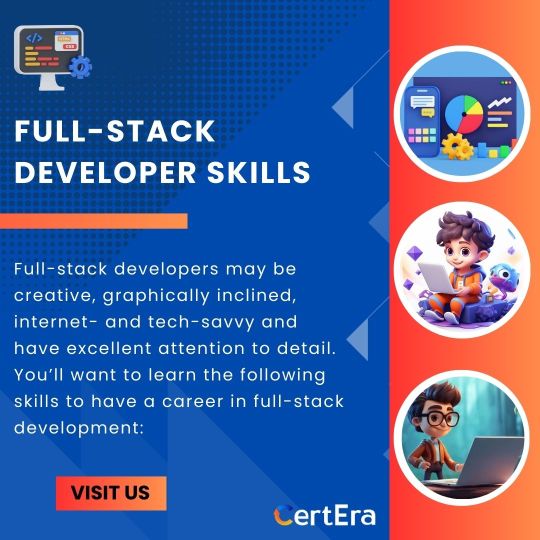
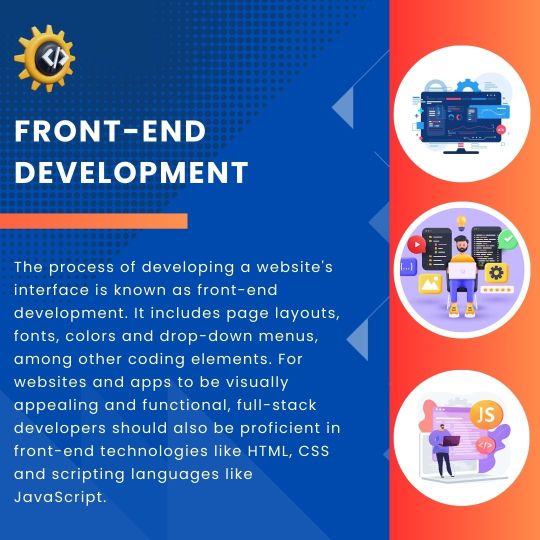
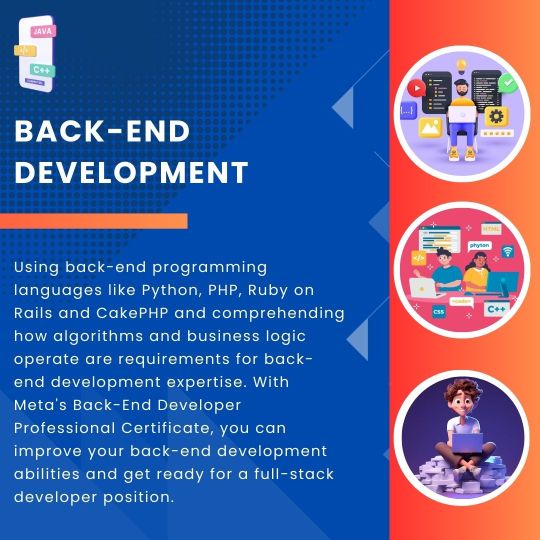

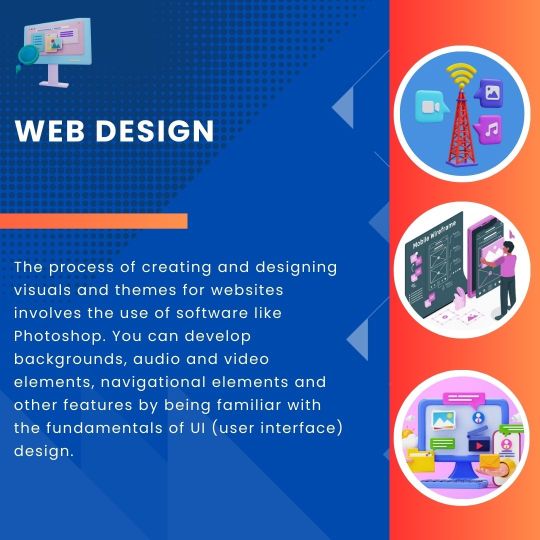
Explore the Full-stack developer skills
“Unlock Your Career Potential: Enroll Now with Certera for Accelerated Growth!”
Visit our website for more information or to explore the courses.
Follow us on LinkedIn, X, YouTube and Instagram.
0 notes
Text
Best Web Development Services in Mumbai
Web development refers to the tasks of running websites and web applications online in a browser but can also include web design, web programming, and database management. Web development types are categorized as front-end development, back-end development, and full stack development. For the best interactive website or web application application for your business, you need experienced developers who are good at their calling. Web development includes many different aspects, including the creation of a website's design and code to create a functioning website. Web development empowers individuals and businesses to establish a distinctive online presence, providing global connectivity and access to information. To be a Web Developer, you need to have an understanding of HTML, CSS, and JavaScript. CSS and CSS programming courses are also recommended. analysis. Analysis of the Web Development Process Model and Data Collection It is important to understand the objectives of the website and how those objectives can be achieved. Web development is used to develop web applications that provide specific functionality. Is web development a good profession in the future? Yes, web development is a good choice for business. Since the field is always saturated with fire technology and there are constant technological changes in the market to adapt, the demand for skilled web developers is endless What exactly is web development? Web development is closely related to the task of designing the features and functionality of websites and apps (often referred to as “web design”), but the term “web development” is often reserved for the actual design and layout of websites and apps In conclusion, every web development project offers unique opportunities to understand and apply different technologies and principles. These hands-on experiences are key to successful web development and will give you a set of skills that are invaluable in the tech industry.

#html#coding#programming#web development#web design#web solutions#web programming#back-end development#CSS#best web development in mumbai
1 note
·
View note
Text
Three Types of Web Developments:
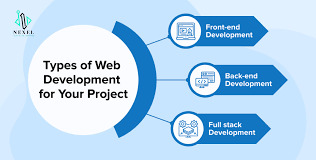
The three types of web development provide a comprehensive understanding of the intricate processes involved in creating a professional website. Whether engaging with a web development agency or considering a career in web development, the knowledge gained from this exploration sets the foundation for continuous learning and adaptation in this dynamic field.
#Web Development#Professional Webdevelopment#Front-end Development#Back-end Development#Full-stack Development#Web Development Agency
0 notes
Text
A Back-End Developer's Odyssey in Crafting Dynamic Web Experiences
In the bustling world of technology, back-end developers stand as architects of the digital realm, weaving intricate codes and algorithms to breathe life into websites and web applications. Among them, individuals with industry experience like myself embark on a relentless quest to innovate, to push boundaries, and to shape the digital landscape with our expertise and passion.
A Journey of Expertise and Innovation
My journey as a back-end developer began with a fervent curiosity and a desire to create impactful digital experiences. With years of industry experience under my belt, I have honed my skills in building websites and web applications that not only meet but exceed the expectations of clients and users alike. From small-scale projects to enterprise-level solutions, each endeavor has been a testament to my commitment to excellence and innovation.
Harnessing the Power of Technology
At the core of my expertise lies a mastery of cutting-edge technologies and frameworks. Whether it's leveraging PHP frameworks like Laravel to streamline development workflows, implementing RESTful APIs for seamless communication between front-end and back-end systems, or integrating databases to efficiently manage data, I am well-versed in the tools and techniques that drive modern web development forward.
Crafting Seamless User Experiences
In the age of digital transformation, user experience reigns supreme. As a back-end developer, my goal is not only to create functional and reliable systems but also to craft seamless and intuitive user experiences. From optimizing performance and scalability to implementing responsive design and accessibility features, every decision is made with the end-user in mind, ensuring that the digital experiences I create leave a lasting impression.
Collaborating for Success
Success in web development is not achieved in isolation. Collaboration is key, whether it's working closely with designers to bring visual concepts to life, collaborating with front-end developers to ensure seamless integration, or partnering with stakeholders to align project goals with business objectives. By fostering a culture of collaboration and communication, I am able to deliver projects that exceed expectations and drive tangible results.
Embracing Continuous Learning and Growth
In the ever-evolving landscape of technology, staying ahead requires a commitment to continuous learning and growth. As a back-end developer, I embrace this ethos wholeheartedly, seeking out new challenges, exploring emerging trends, and expanding my skill set to adapt to the evolving needs of the industry. Whether it's attending workshops, participating in online courses, or contributing to open-source projects, I am always eager to learn and grow as a developer.
Conclusion: Shaping the Future of Web Development
In conclusion, my journey as a back-end developer is a testament to the transformative power of technology and the unwavering dedication to craftsmanship and innovation. With industry experience building websites and web applications, I stand ready to empower the digital landscape with my expertise and passion. As we embark on the next chapter of web development, I am excited to continue pushing boundaries, driving innovation, and shaping the future of the digital world.

1 note
·
View note
Text
Unveiling the Magic Behind Back-End Development Decoding the Digital Backbone
In web and software development, there exists a hidden world that powers the seamless functionality we often take for granted the world of back-end development. While users interact with sleek interfaces and engaging features, it's the back end that serves as the digital backbone, orchestrating data management, processing requests, and ensuring smooth operations behind the scenes. In this blog post, we embark on a journey to unravel the magic behind back-end development, shedding light on its significance, components, and intricacies that make it the unsung hero of the digital landscape.
Understanding Back-End Development
At its core, back-end development focuses on the server-side logic of web applications, encompassing everything that happens behind the curtains. Unlike front-end development, which deals with the user interface and client-side interactions, the back end handles server-side operations, database management, and the integration of various systems to deliver dynamic content to users.
The Digital Backbone: Key Components
Server: At the heart of back-end development lies the server, a robust computing system responsible for processing requests and delivering responses to client devices. Whether it's a traditional physical server or a cloud-based solution, servers play a pivotal role in ensuring the reliability and scalability of web applications.
Databases: Data is the lifeblood of any application, and databases serve as the storage and retrieval mechanism for managing vast amounts of information. From relational databases like MySQL and PostgreSQL to NoSQL databases like MongoDB and Redis, developers leverage various technologies to store, organize, and manipulate data efficiently.
ApplicationLogic: Back-end developers write code that governs the behavior of web applications, implementing business logic, authentication mechanisms, and data processing algorithms. Using programming languages such as Python, Java, Ruby, or Node.js, developers craft the functionality that powers the application's core operations.
APIs (Application Programming Interfaces): APIs serve as the bridge between different software components, allowing them to communicate and interact seamlessly. Whether it's integrating third-party services, enabling data exchange between systems, or building modular architectures, APIs play a crucial role in facilitating interoperability and extensibility.
Decoding the Development Process
The journey of back-end development typically follows a structured process, encompassing several stages from planning and architecture to implementation and deployment:
Requirement Analysis: Understanding the project's objectives, functionality, and user requirements lays the foundation for effective back-end development. This phase involves gathering insights, defining the scope, and outlining the features and functionalities that the application will offer.
Architecture Design: Designing the back-end architecture involves making critical decisions regarding the technology stack, database structure, and scalability options. Architects devise scalable, resilient, and secure solutions that cater to the application's current needs while accommodating future growth.
Development: Armed with a blueprint, developers embark on writing code, implementing features, and integrating components to bring the back-end architecture to life. This phase involves writing clean, efficient code, adhering to best practices, and ensuring compatibility with other system components.
Testing and Debugging: Rigorous testing is essential to validate the functionality, performance, and security of the back-end system. Developers conduct unit tests, integration tests, and end-to-end tests to identify and rectify bugs, ensuring the robustness and reliability of the application.
Deployment and Maintenance: Once the back-end system passes through testing, it's ready for deployment to production environments. Deployment involves configuring servers, setting up databases, and deploying application code, followed by ongoing maintenance, monitoring, and optimization to ensure smooth operations.
Embracing the Magic of Back-End Development
While front-end development often garners more attention due to its visible impact on user experience, back-end development forms the backbone that sustains the entire digital ecosystem. From e-commerce platforms processing transactions to social media networks serving millions of users concurrently, back-end systems power the intricate machinery that drives modern-day applications.
As technology continues to evolve and user expectations soar, the role of back-end development becomes increasingly pivotal. Developers must stay abreast of emerging trends, technologies, and best practices to build scalable, secure, and high-performance back-end solutions that meet the demands of today's digital landscape.
Conclusion
Back-end development remains an indispensable aspect of web and software development, embodying the unseen forces that drive innovation and enable seamless digital experiences. By unraveling the magic behind back-end development and understanding its intricate workings, we gain a deeper appreciation for the digital backbone that powers our interconnected world.
#custom ecommerce development#Back-End Development#wordpress development#mobile app testing services#digital marketing company in ahmedabad
1 note
·
View note